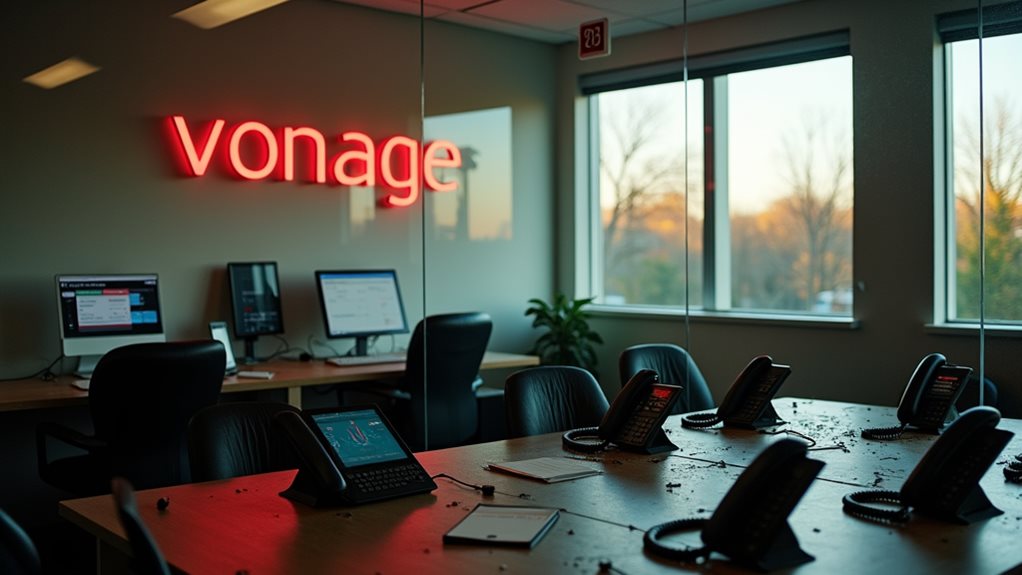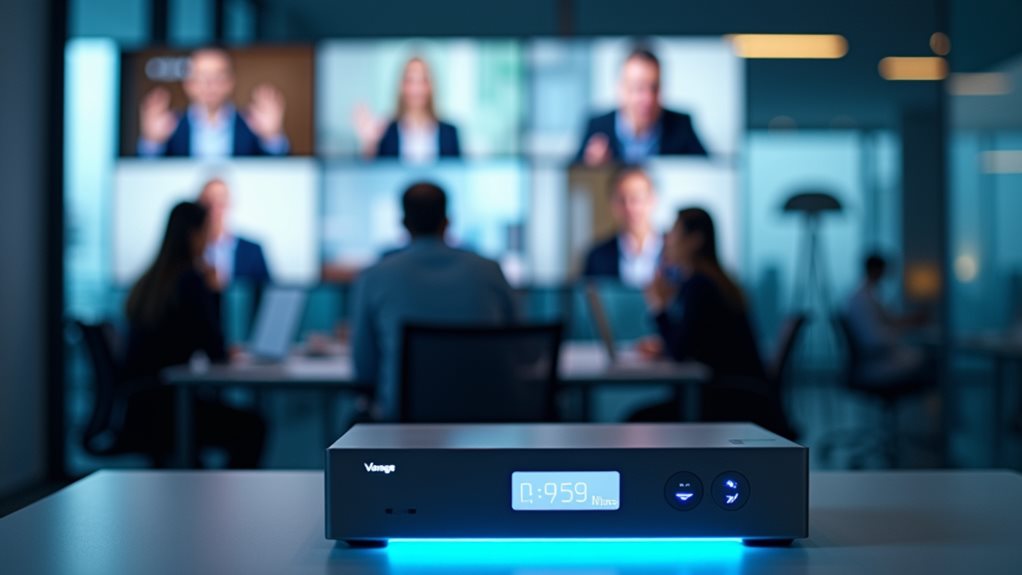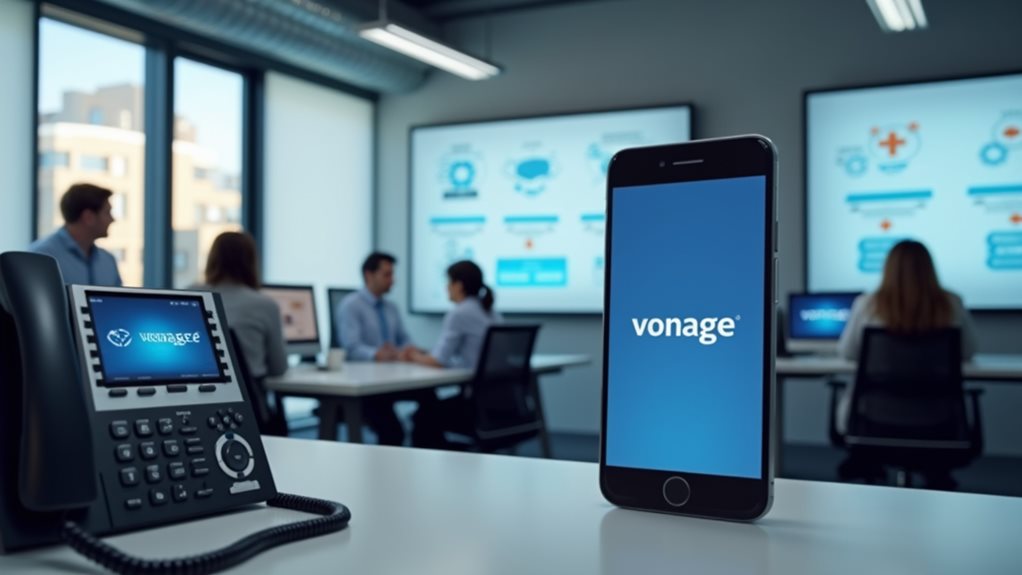Yes, Vonage is still actively operating as part of Ericsson, following a $6.2 billion acquisition in 2022. You’ll find they’ve shifted their focus from residential services to enterprise communications, serving over 120,000 business customers worldwide. While they’ve faced some financial challenges, including recent revenue declines, they remain a significant player in cloud communications and CPaaS solutions. The company’s evolving strategy and market position suggest there’s more to their transformation story.
Current Operational Status Under Ericsson
While Vonage continues to operate under Ericsson’s ownership, the company’s services are experiencing varying degrees of performance across different regions and platforms.
You’ll find that Vonage is actively addressing operational challenges, particularly in the NAM region where service recovery efforts are underway for the VCC portal and ContactPad. VoIP technology enables businesses to communicate effectively, making it essential that Vonage resolves these issues promptly.
Recent data shows the company successfully resolved call control issues within approximately 33 minutes of detection.
If you’re using the system, you should be aware of specific service improvements being implemented, including fixes for Polish callback functionality and Chrome browser compatibility issues.
The platform offers comprehensive real-time monitoring capabilities for tracking system performance across all services.
While some regions are experiencing temporary disruptions, Vonage’s technical teams are continuously monitoring and resolving incidents to maintain service stability.
When you encounter issues, you’re encouraged to contact support or try recommended workarounds, such as using alternative browsers or disabling Chrome extensions until permanent solutions are deployed.
The Impact of the 2022 Acquisition
You’ll find it fascinating that Ericsson’s massive $6.2 billion acquisition of Vonage in 2022 hasn’t been smooth sailing, as evidenced by significant financial setbacks including two major impairment charges totaling $4.1 billion.
Despite these challenges, Vonage continues operating as a distinct business unit within Ericsson, now called Business Area Global Communications Platform (BGCP), with former CEO Rory Read joining Ericsson’s executive team. This VoIP technology is essential for modern businesses, enabling enhanced communication and collaboration capabilities.
The Vonage Communications Platform serves over 120,000 customers and plays a crucial role in the company’s ongoing operations.
While the acquisition aimed to expand Ericsson’s enterprise offerings and leverage 5G capabilities, the company’s projected growth rates haven’t met initial expectations, though they’re still targeting $0.4 billion in revenue synergies by 2025. The company maintains strong market positioning as a leader in CPaaS according to the Omdia Universe report.
Ericsson’s $6.2B Investment
As one of the largest telecommunications deals in recent history, Ericsson’s $6.2 billion acquisition of Vonage in July 2022 has transformed both companies’ market positions and future trajectories.
You’ll find the investment rationale particularly compelling, as Ericsson aims to leverage Vonage’s strong presence in the Communications Platform as a Service (CPaaS) market, which is growing at an impressive 28% annually. However, recent impairment charges totaling over $4 billion have raised concerns about the acquisition’s value. Additionally, the global VoIP market is expected to reach $145.76 billion by 2025, indicating a favorable landscape for Vonage in the coming years.
The strategic alignment becomes clear when you consider how Vonage’s API portfolio and 1-million-strong developer community perfectly complement Ericsson’s 5G capabilities. The Vonage Communications Platform will continue serving its 120,000 existing customers while expanding its reach through Ericsson’s network.
For current Vonage customers, there’s good news: the company continues operating under its existing brand while benefiting from Ericsson’s global reach and technological resources.
The deal’s projected revenue synergies of $0.4 billion by 2025 indicate you can expect enhanced services and innovations in the coming years. With the increased demand for remote work solutions driving innovation in VoIP technology, customers can anticipate advanced features that will improve their communication experiences.
Integration and Revenue Challenges
Despite Ericsson’s ambitious plans for Vonage, the post-acquisition period has revealed significant integration and revenue challenges that’ve impacted both companies. You’ll find that integration hurdles have led to substantial financial setbacks, including two major writedowns totaling $4.1 billion. Ericsson has announced a SEK 11.4 billion impairment charge for Q2 2024.
If you’re following Vonage’s journey, here are the key challenges they’re facing:
- SMS service disruptions and filtering requirements have affected their core communications offerings. Recent data shows their US messaging traffic paused completely, demonstrating serious operational issues.
- Revenue recovery efforts have been hampered by lower-than-expected market growth rates, indicating a trend towards greater adoption of VoIP technologies.
- Integration of 5G APIs and network capabilities has proven more complex than anticipated.
While Ericsson remains committed to its long-term strategy, you’ll notice they’re actively working to overcome these obstacles through strategic partnerships with AWS, Verizon, and other major telecom operators.
Recent Financial Performance and Challenges

While Vonage continues operating under Ericsson’s ownership, the company’s recent financial performance has raised concerns.
You’ll notice a significant shift in their revenue analysis, with a 5% year-over-year decline in Q1 2024, marking a notable change from their pre-acquisition growth trajectory. Their VCP service delivered 25% revenue growth in Q3 2021, highlighting how drastically things have changed.
Their strategic positioning has also faced challenges, evidenced by Ericsson’s substantial $2.92 billion impairment charge in November 2023. The company has started reducing global operations to manage costs more effectively.
You’re probably wondering about the company’s future outlook.
While Vonage is actively working on building their Global Network Platform with Ericsson’s 5G networks, there’s potential for additional impairment charges ahead.
Under new CEO Niklas Heuveldop’s leadership, they’re focusing on integrating Vonage’s CPaaS APIs with Ericsson’s infrastructure, though the road to recovery may require patience and strategic realignment.
Service Reliability and Technical Issues
Vonage’s infrastructure tells an impressive story of technological resilience and redundancy. You’ll find their service quality backed by a robust system that monitors over 1,000 metrics and generates 14,000 data points per second. Their technical reliability stems from multiple safeguards and continuous testing.
Their commitment to dependable service is evident through:
- Geographically dispersed nodes that maintain operations even if some locations fail
- Multiple database servers that replicate your call plans in real-time
- 24/7 monitoring teams that guarantee continuous service delivery
While Vonage claims 99.999% uptime reliability, user experiences vary. Business customers generally report better experiences than residential users, with domestic calls maintaining consistent quality.
You’ll find their international call quality sometimes falls short of domestic standards, but their infrastructure continues to evolve with regular performance analysis since 2011. Additionally, network optimization practices can further enhance call quality and reliability for users in various locations.
Market Position in Enterprise Communications

Beyond reliable service infrastructure, the enterprise communications landscape showcases a different side of this telecommunications giant.
You’ll find Vonage firmly positioned as a market leader, particularly in serving large enterprises with revenues exceeding $1000M, where enterprise scalability meets sophisticated customer engagement needs.
What’s particularly significant is Vonage’s dominance in the CPaaS Omdia Universe report, where they’ve secured top rankings in eight out of ten categories.
Their integrated platform, which seamlessly connects CPaaS, UCaaS, and CCaaS capabilities, makes them a compelling choice for businesses seeking extensive communication solutions.
If you’re operating in the IT and Services sector, you’re in good company – it represents 38% of Vonage’s customer base, demonstrating their deep understanding of technology-driven enterprises’ unique requirements. Additionally, Vonage’s cost-effective communication solutions position them as an attractive choice, especially for businesses looking to optimize operational costs.
Changes in Global Business Strategy
You’ll find Vonage’s recent shift in market operations revealing significant changes, particularly since Ericsson’s acquisition has reshaped their global strategy.
The company’s focus has evolved from primarily serving residential customers to expanding their enterprise solutions across international markets, with a strong emphasis on digital transformation and cloud communications.
Through Ericsson’s integration, Vonage has strengthened its position in key growth markets while developing new partnerships and expanding their product portfolio to meet evolving business needs. This aligns with the trend towards advanced communication options that enhance collaboration and efficiency in businesses.
Shifting Market Operations Focus
Over the past decade, a significant transformation has shaped the strategic direction of this telecommunications giant, marking a clear shift from residential VoIP services to extensive business communications solutions.
You’ll notice this market adaptation reflects a deeper understanding of evolving customer needs and operational agility in today’s digital landscape.
The company’s shifting focus encompasses three primary areas:
- Integration of AI and automation for enhanced customer experiences
- Expansion into global markets, particularly in Asia and Latin America
- Development of industry-specific solutions across various sectors
You’re witnessing a company that’s positioning itself at the forefront of business communications, moving beyond traditional services to embrace digital transformation. This strategic pivot demonstrates Vonage’s commitment to meeting modern enterprise needs while maintaining its competitive edge in the telecommunications market, as evidenced by their adoption of AI integration in VoIP to improve communication efficiency and customer satisfaction.
Ericsson’s Integration Impact
While thorough data about Ericsson’s direct impact on Vonage remains limited, the company’s strategic initiatives continue to evolve through global expansion and technological innovation.
You’ll find that despite potential integration challenges, Vonage maintains its focus on growth through strategic alignment with market demands.
As you explore Vonage’s current operations, you’ll notice their commitment to expanding into new territories, particularly in Asia and Latin America.
They’re actively forming strategic partnerships and investing in cutting-edge technologies, including AI and machine learning solutions.
Moreover, Vonage’s services are also leveraging the advantages of VoIP’s cost savings to attract more international business clients.
You’re part of a market that’s witnessing Vonage’s adaptation to cloud-based communications and remote work trends, while they prioritize security and compliance to meet your business needs.
Their continued emphasis on innovation and customer service demonstrates their dedication to long-term success.
Product Portfolio and Service Offerings

Vonage’s extensive product portfolio spans four distinct categories, each designed to meet specific communication needs.
With their Unified Communications and Contact Center solutions, you’ll find all-encompassing tools that keep your business connected and productive.
Here’s what you can expect from their core offerings:
- Advanced communication features including 40+ voice capabilities, messaging, and conferencing tools that let you work from anywhere
- Customizable contact center solutions that integrate seamlessly with your existing CRM systems
- Programmable APIs that enable you to create personalized customer experiences across multiple channels
You’ll also find residential VoIP services that bring modern features to home phone systems. Additionally, Vonage offers compelling messaging options that enhance communication for businesses.
Whether you’re running a global enterprise or need reliable home communication, Vonage’s solutions are designed to keep you connected through their robust network infrastructure.
Competition and Industry Landscape
As cloud communications continue to reshape the business landscape, the VoIP market has exploded to an impressive $131.89 billion valuation in 2024, with projections showing even more dramatic growth ahead.
You’ll find yourself in an increasingly competitive landscape where providers are racing to offer the most innovative solutions.
Current VoIP trends show a strong push toward 5G integration, which is expected to handle 25% of mobile traffic by 2024.
You’re part of an industry that’s rapidly evolving, with providers focusing on enhanced security, voice analytics, and seamless collaboration tools.
While companies like Vonage compete in this space, they’re adapting to meet growing demands for remote work solutions and improved service quality.
The market’s projected growth to $270.05 billion by 2029 signals robust opportunities for both providers and users alike.
Future Growth Prospects and Outlook

Despite market challenges over recent years, you’ll find Vonage actively pursuing growth through its Communications Platform as a Service (CPaaS) innovations.
The company’s strategic focus on cloud-based solutions and AI-driven technologies positions it well for recovery in today’s evolving communications landscape.
You can expect Vonage to continue expanding its market presence through targeted investments in cutting-edge technology while addressing the increasing demand for integrated communication solutions.
Market Recovery Challenges
The future growth prospects for cloud communications remain complex, yet they’ll require careful navigation through several market recovery challenges.
As you explore the evolving market trends, you’ll find that customer retention has become increasingly crucial for success in this competitive landscape.
To understand the key challenges you’ll need to address, consider these critical factors:
- Growing competition in telecommunications requires innovative solutions to maintain your market position.
- Regulatory changes across different regions demand adaptable business strategies.
- Meeting heightened customer expectations while maintaining service quality is essential.
You’re part of an industry that’s experiencing significant transformation, and staying ahead means understanding these dynamics.
While Vonage faces these challenges, they’re actively working to strengthen their market position through strategic adaptations and continuous improvement.
Growth Through CPaaS Innovation
While cloud communications continue evolving rapidly, Vonage’s strategic focus on CPaaS (Communications Platform as a Service) innovation positions them strongly for future growth.
You’ll see their CPaaS evolution taking shape through expanded offerings in omnichannel integration, advanced analytics, and enhanced developer tools.
As part of their innovation strategies, Vonage isn’t just keeping pace – they’re actively shaping the future of business communications.
With the global CPaaS market projected to reach $29 billion by 2025, you’re looking at a company that’s investing heavily in product development and strategic partnerships.
Their emphasis on security, real-time analytics, and vertical expansion demonstrates their commitment to meeting your evolving needs.
Whether you’re interested in remote work solutions or digital transformation initiatives, Vonage’s roadmap suggests they’ll remain a significant player in the communications landscape.
Strategic Direction Under Ericsson Leadership
Since Ericsson’s acquisition of Vonage in July 2022, the company’s strategic direction has taken a decidedly innovative turn.
Through strategic acquisitions and enterprise expansion, Ericsson’s transforming how businesses access and utilize communication technology.
You’ll find Vonage’s future is firmly secured with Ericsson’s leadership, as they’re focusing on three key areas:
- Developing new 5G network APIs to enhance communication capabilities
- Increasing R&D investments in UCaaS and CCaaS solutions
- Expanding partnerships with Communication Service Providers (CSPs)
You’re looking at a company that’s not just surviving but thriving.
With Ericsson’s commitment to invest in Vonage’s growth and their projection of $0.4 billion in revenue synergies by 2025, you can trust that Vonage remains a strong player in the communications technology space.
Frequently Asked Questions
Can I Keep My Old Vonage Phone Number if I Switch Providers?
Yes, you can keep your number through number porting when switching providers from Vonage. You’ll need to gather documentation and work with your new provider, but most numbers can be transferred within 10-15 days.
Does Vonage Offer Residential Phone Services for Home Users Anymore?
Yes, you can still get Vonage’s residential VoIP technology for your home phone services. They offer plans starting at $9.99/month, including all the features you’ll love like crystal-clear calling and visual voicemail.
What Happens to Existing Vonage Contracts After Employee Layoffs?
Your existing Vonage contracts won’t be affected by employee layoffs. Contract termination isn’t triggered by staffing changes, and employee rights issues remain separate from service agreements. You’ll continue receiving your services without interruption.
Are Vonage Mobile Apps Still Being Updated and Supported?
Yes, you’ll find that Vonage actively maintains their mobile apps with regular updates. Their latest versions were released in January/February 2025, though some users report mixed app performance and provide ongoing feedback for improvements.
Does Vonage Still Maintain Physical Retail Stores or Sales Offices?
You won’t find physical retail stores from Vonage today, as their retail presence focuses entirely on digital solutions. Their sales strategy operates through corporate offices and online channels rather than traditional storefronts.
Final Thoughts
You’ll find that Vonage is not only still operating but thriving under Ericsson’s leadership since the 2022 acquisition. While the company has evolved from its consumer VoIP roots, it’s now a significant player in enterprise communications, offering cloud-based solutions and APIs. If you’re considering Vonage’s services, you can be confident in its stability, backed by Ericsson’s resources and commitment to innovation in the telecommunications space.

